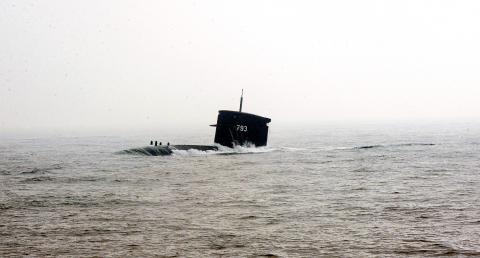Taiwan’s two combat-capable submarines will be equipped with anti-ship missiles next year, providing the nation’s undersea force with a long-distance strike capability it had previously lacked.
The Chinese-language United Daily News reported on Wednesday that more than 30 US-built surface-to-surface Harpoon cruise missiles would become operational on the two Hailung-class submarines sometime next year. The subsonic sea-skimming missiles, which have a range of about 125km, will bring targets along the Chinese coast within range.
The navy recently test-fired the weapons in the US in preparation for their installation on the Dutch-built submarines, the report said, citing unnamed navy sources.

Photo: Chang Chia-ming, Taipei Times
A US$6.4 billion arms sale notification to US Congress in October 2008 included 32 UGM-84L sub-launched Harpoon Block II missiles, plus two UTM-84L exercise missiles and two weapon control systems for Taiwan.
The US Department of Defense awarded a US$43.85 million defense contract to Boeing for the production and procurement of 32 Harpoon missiles for Taiwan in June 2010, with work to be completed in June last year.
The navy has declined to comment on the report, citing a policy of not discussing arms purchases with the media. Taiwan’s frigates and F-16 aircraft are already armed with Harpoon missiles.
However, integrating the Harpoon missiles requires substantial modifications to existing fire control systems and launch tubes and some defense analysts have been skeptical as to whether the Hailungs could accommodate them. Reports last year that indigenously made Hsiung Feng II cruise missiles had been test-launched on the subs were discredited soon afterwards.
However, the latest news is far more credible. The navy first announced its intention to modify the submarines so they could fire Harpoon missiles back in 2005.
Approached for comment, a retired navy officer told the Taipei Times yesterday that the project was entirely feasible.
A standalone fire control system that does not interfere with existing combat systems must be developed, the source said, adding that while it was possible to have the Harpoon fire control system integrated to current systems, doing so would require complicated engineering modification work.
In addition to the fire control systems, adjustments to the torpedo tube mechanism could be necessary to accommodate the launch of both torpedoes and the Harpoon missiles, the source said.
Another option would be to add a standalone launch tube for the Harpoons, he said.
US firm Boeing Co, which was the main contractor for the project, sent experts to Taiwan to assist the navy complete the necessary modifications on the submarines.
Additional work may also have been carried out by Raytheon Corp.

ANOTHER EMERGES: The CWA yesterday said this year’s fourth storm of the typhoon season had formed in the South China Sea, but was not expected to affect Taiwan Tropical Storm Gaemi has intensified slightly as it heads toward Taiwan, where it is expected to affect the country in the coming days, the Central Weather Administration (CWA) said yesterday. As of 8am yesterday, the 120km-radius storm was 800km southeast of Oluanpi (鵝鑾鼻), Taiwan’s southernmost tip, moving at 9kph northwest, the agency said. A sea warning for Gaemi could be issued tonight at the earliest, it said, adding that the storm is projected to be closest to Taiwan on Wednesday or Thursday. Gaemi’s potential effect on Taiwan remains unclear, as that would depend on its direction, radius and intensity, forecasters said. Former Weather Forecast

As COVID-19 cases in Japan have been increasing for 10 consecutive weeks, people should get vaccinated before visiting the nation, the Centers for Disease Control (CDC) said. The centers reported 773 hospitalizations and 124 deaths related to COVID-19 in Taiwan last week. CDC Epidemic Intelligence Center Director Guo Hung-wei (郭宏偉) on Tuesday said the number of weekly COVID-19 cases reported in Japan has been increasing since mid-May and surpassed 55,000 cases from July 8 to July 14. The average number of COVID-19 patients at Japan’s healthcare facilities that week was also 1.39 times that of the week before and KP.3 is the dominant

The Chinese Communist Party’s (CCP) working group for Taiwan-related policies is likely to be upgraded to a committee-level body, a report commissioned by the Mainland Affairs Council (MAC) said. As Chinese President Xi Jinping (習近平) is increasingly likely to upgrade the CCP’s Central Leading Group for Taiwan Affairs, Taiwanese authorities should prepare by researching Xi and the CCP, the report said. At the third plenary session of the 20th Central Committee of the CCP, which ended on Thursday last week, the party set a target of 2029 for the completion of some tasks, meaning that Xi is likely preparing to

US-CHINA TRADE DISPUTE: Despite Beijing’s offer of preferential treatment, the lure of China has dimmed as Taiwanese and international investors move out Japan and the US have become the favored destinations for Taiwanese graduates as China’s attraction has waned over the years, the Ministry of Labor said. According to the ministry’s latest income and employment advisory published this month, 3,215 Taiwanese university graduates from the class of 2020 went to Japan, surpassing for the first time the 2,881 graduates who went to China. A total of 2,300 graduates from the class of 2021 went to the US, compared with the 2,262 who went to China, the document showed. The trend continued for the class of 2023, of whom 1,460 went to Japan, 1,334 went to